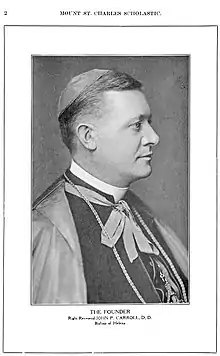Carroll College
Carroll College is a private Catholic college in Helena, Montana. The college has 21 buildings on a 63 acre campus,[3] has over 35 academic majors,[4] participates in 15 NAIA athletic sports,[5] and is home to All Saints Chapel.[6] The college motto, in Latin, is “Non scholae, sed vitae.” The college translates this into English as “Not for school, but for life.” Carroll's colors are purple and gold[7] and the school's athletics teams are known as the Fighting Saints.
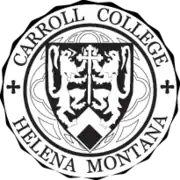 | |
| Motto | Non Scholae Sed Vitae |
|---|---|
Motto in English | Not For School, But For Life. |
| Type | Private college |
| Established | 1909 |
Religious affiliation | Catholic Church |
Academic affiliations | Space-grant |
| Endowment | $44.8 million (2019)[1] |
| President | John E. Cech |
| Undergraduates | 1,430 (2015)[2] |
| Location | , , United States |
| Campus | Rural |
| Colors | Purple and Gold |
| Athletics | NAIA – Frontier Conference |
| Nickname | Fighting Saints |
| Mascot | Halo, St. Bernard |
| Website | www.carroll.edu |
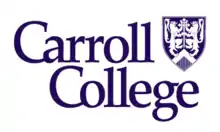 | |
History
In 1883, the first bishop of Helena, John Baptist Brondel,[8] proposed a Catholic college in Montana to help produce future priests for the soon-to-be diocese of Helena. Unfortunately, he died before his plans could be realized. Pope Pius X selected as Brondel's successor a young priest from Dubuque, Iowa: John Patrick Carroll.
At the beginning of the 20th century, Bishop John Patrick Carroll, second Bishop of the Diocese of Helena, had a dream to build a Catholic college in western Montana. Bishop Carroll was able to carve out the funding needed to launch the institution while at the same time raising money for the construction of the Cathedral of St. Helena. In 1909, that dream became reality when William Howard Taft, 27th President of the United States, helped lay the cornerstone of St. Charles Hall.[9][10]
The college was founded on September 27, 1909 by John Patrick Carroll, second Bishop of the Diocese of Helena, Montana. It was originally called Mount St. Charles College to honor St. Charles Borromeo. The intent at the time of the college's founding, was to be an all-men's liberal arts college with an emphasis on preparing men for careers in the priesthood, law, medicine, teaching and engineering. In his speech after the laying the cornerstone of St. Charles Hall, President William Howard Taft stated "The college you are building here will be a blessing to Helena and to the whole state of Montana. The only trouble is we have not institutions enough of this kind in the United States."[11]
In September 1910, Mount Saint Charles College opened its doors for classes, and the first college student graduated in 1916. In 1932, the school’s name was changed to Carroll College in honor of its founder.
During the 1935 Helena earthquake, Carroll College suffered only minor damage while many other buildings and schools were greatly impacted.[12] However, the top of the gable wall on the southern portion of St. Charles Hall were damaged and many of the structure's large stones had fallen off. The college decided to replace the roof with a slightly shorter and flatter roof. The fallen stones were repurposed and used to build an observatory on campus. Carroll College's Neuman Observatory, named after former chemistry professor Edward Neuman, is the oldest astronomical observatory in the state of Montana.[13]
During World War II, Carroll College was one of 131 colleges and universities nationally that took part in the V-12 Navy College Training Program which offered students a path to a Navy commission.[14] After the war, the college began a period of progressive expansion[15] that included enrolling many military veterans, admitting the first female students,[16] and being transformed by the Second Vatican Council.
The 1989 Helena train wreck caused significant damage to Carroll, notably to Guadalupe Hall, the women's dormitory at the time.[17]
Student life
Carroll College has a female to male student ratio of nearly 3:2 (60%/40%). Montana residents comprise just under half of the total student body (Montana/Out-of-State: 45%/55%). Of students reporting a religious preference, 44% are Catholic.[18] From an admissions standpoint, US News and World Report indicates Carroll as being "more selective" with an average incoming GPA of 3.46, an ACT of 25, an average SAT (prior to March 1, 2016) of 1645, and an average SAT (after March 1, 2016) of 1145.[19] Tuition and fees for the 2014-15 academic year are $28,607. Total estimated attendance (with room and board) is approximately $40,220.
Carroll has over 35 active student clubs or student groups that host nearly 350 events annually.[20] Groups include CAMP, or Carroll Adventuring and Mountaineers Program, Carroll Crazies, Up 'Til Dawn, Saints' Swing Dance Society, Engineers Without Borders, Carroll Student Activities (CSA), and Carroll Outreach Team.[21] CAMP offers mountain biking, kayaking, trail running, hiking, backpacking, cross country skiing, downhill skiing, and more. CAMP provides trips for students to explore the outdoors during academic breaks, such as a spring break to Moab, UT.[22] The Carroll College newspaper, The Prospector[23], is student-run and student-written.
Academics
Carroll college offers numerous academic majors in the major liberal arts and life sciences, as well as engineering, education, computer science, nursing, physics, ROTC, and theology. The school offers as well as several medical pre-professional programs including pre-seminary, pre-med, pre-dental, pre-pharmacy and pre-veterinary. The school is known for a higher than average rate of acceptance of its students into medical school.[24] The national average medical school acceptance rate is approximately 44%.[25] Carroll College students have an 85% average acceptance into med school and dental school.[26] Unique to the college is a Human-Animal Bond Program, now anthrozoology . It offered the first such undergraduate degree in the US.[27]
The college is ranked by U.S. News and World Report as the #1 Regional College in the West in the 2021 edition of America's Best Colleges. Carroll College has held the #1 ranking for 10 consecutive years.[28]
Campus

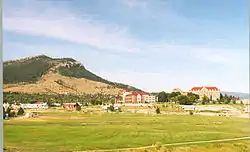
Carroll College has four residence halls on campus. These are Trinity Hall, Borromeo Hall, Guadalupe Hall, and St. Charles Hall. Additionally, Carroll has on-campus apartments open to 3rd year students and above. Carroll has community advisors on every floor of every residence hall, and community advisers are in charge of putting on events for members of his or her floor.
The football stadium is known as Nelson Stadium. In 2017, the Hunthausen Activity Center (HAC) will house student recreation and fitness.[29] The Student Center is informally known as "The Cube," derived from "Carroll Campus Center," or C-cubed.
Simperman Hall houses classrooms, science labs, and offices for professors. Wiegand Amphitheater, located in Simperman Hall, seats approximately 140 students, and student groups sometimes show movies for the student body. Built in 1979, the Corette Library houses classrooms, computer labs, study rooms, conference rooms, and a small auditorium. It is open to the general public for use.[30] St. Charles has classrooms, professors' offices, a small chapel, and the president's office and staff. In addition, the Artaza center—the center for global education—is located in St. Charles.[31] On the fourth floor of St. Charles is the bouldering wall, open to students to climb.[32] Old North, the north wing of St. Charles, was a gymnasium for Mount St. Charles College. Old North was deconstructed and rebuilt to be All Saints Chapel, finished in 2017. St. Albert's Hall is the alumni and development office. The Civil Engineering building has a fully equipped lab, and the engineering department hosts occasional barbecues.[33][34]
Athletics
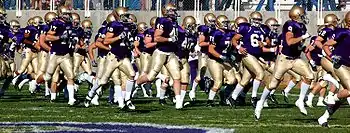
Carroll College teams, nicknamed athletically as the Fighting Saints, are part of the National Association of Intercollegiate Athletics (NAIA), primarily competing in the Frontier Conference. Men's sports include basketball, cross country, football, golf, soccer, and track & field; while women's sports include basketball, cross country, soccer, softball, track & field and volleyball.[35]
Nelson Stadium is home to the football and soccer teams; the PE Center hosts basketball and volleyball games along with several other community events; the Green Meadow Country Club is home to the golf teams; Helena's Centennial Park hosts the softball team's home games; and the track & field teams host events at Helena's Vigilante Stadium.[36]
The Carroll Fighting Saints football team began playing in 1920 and is one of the most successful programs in the NAIA division of college football. The team has won 11 straight Frontier Conference Championships (2000–2011), ten national final appearances, including six straight (2000–2005, 2007, 2008, 2010, 2011), and six NAIA National Football Championships in ten years (2002–2005, 2007, 2010). The 1931 football team was undefeated, untied, and unscored upon and finished the season as state champions. The Fighting Saints were also the first collegiate coaching home for John Gagliardi, known as the winningest coach in all of college football (regardless of division). Gagliardi coached at Carroll for four years before moving to St. John's University in Minnesota, where he coached them for 60 seasons.
Notable alumni
- Casey FitzSimmons, NFL tight end, Detroit Lions (2003–09)
- John Gagliardi, college football head coach
- Sinan Güler, Turkish professional basketball player
- Norman "Jeff" Holter, biophysicist
- Raymond Hunthausen, Archbishop of Seattle (1975–91)
- Joseph Monaghan, congressman from Montana (1933–37)[37]
- Jerry O'Connell, congressman from Montana (1937–39)[38]
- Bobby Petrino, head football coach at the University of Louisville
- Paul Petrino, head football coach at the University of Idaho
- Marc Racicot, Governor of Montana (1993–2001)[39]
- George Thomas, Bishop of Helena (2004–18), Bishop of Las Vegas (2018–present)
- Bernard Topel, Bishop of Spokane (1955–78)
- Tarah Wheeler, Cybersecurity Executive and Author of "Women in Tech" [40]
References
- As of June 30, 2019. "U.S. and Canadian 2019 NTSE Participating Institutions Listed by Fiscal Year 2019 Endowment Market Value, and Percentage Change in Market Value from FY18 to FY19 (Revised)". National Association of College and University Business Officers and TIAA. Retrieved September 14, 2020.
- Carroll College - Facts, information and more about Carroll College
- "Carroll Campus". Carroll College. 2016-09-26. Retrieved 2020-09-16.
- "Explore Academics". Carroll College. 2015-12-14. Retrieved 2020-09-16.
- "Carroll College Athletes - Official Athletics Website". Carroll College Athletes. Retrieved 2020-09-16.
- "All Saints Chapel". Carroll College. 2017-08-03. Retrieved 2020-09-16.
- "Visual Identity Guide". Carroll College. 2018-01-12. Retrieved 2020-09-16.
- "1884-1903 Bishop Brondel |". Retrieved 2020-09-16.
- "Carroll_College". www.helenahistory.org. Retrieved 2020-09-16.
- Record, Independent. "St. Charles Hall, Carroll College, Helena". The Billings Gazette. Retrieved 2020-09-16.
- The Pioneer. Helena, MT: Carroll College. 1930. p. 9.
- "SCHOOLS OF CITY ARE HARD HIT BY EARTH SHOCKS; LOSS MAY REACH A HALF MILLION". Helena Independent Record. October 20, 1935.
- Writer - 04/15/07, MARGA LINCOLN-IR Staff. "Reaching for the stars". Helena Independent Record. Retrieved 2020-09-16.
- "St Charles Hall, Carroll College, Helena, Montana". Helena, Montana: Carroll College. 2011. Archived from the original on 2012-03-30. Retrieved September 27, 2011.
- Swartout Jr., Robert (2009). Bold Minds & Blessed Hands The First Century Of Montana's Carroll College. Helena, MT: Carroll College.
- "Carroll professor writes its history". The Billings Gazette. Associated Press. Retrieved 2020-09-16.
- "20 years ago today, Helena shook, rattled and froze". Retrieved 28 August 2016.
- "Carroll College About". Retrieved 2018-02-15.
- "Carroll College". Carroll College- CC- The College Board. The College Board. Retrieved 15 February 2018.
- "Campus Life". Carroll College. 2016-06-06. Retrieved 2020-09-17.
- "Carroll College Student Life". www.carroll.edu. Archived from the original on 2016-04-12. Retrieved 2016-03-22.
- "Upcoming Events". www.carroll.edu. Archived from the original on 2016-04-12. Retrieved 2016-03-22.
- "The Prospector". Carroll College. 2020-09-02. Retrieved 2020-09-16.
- "College Profiles - Carroll College". Retrieved 28 August 2016.
- AAMC. "FACTS: Applicants and Matriculants Data".
- "Carroll College". Carroll College. Archived from the original on 2016-04-11. Retrieved 28 March 2016.
- "Carroll College Anthrozoology". Archived from the original on 2016-07-15. Retrieved 28 August 2016.
- tyler.manning@helenair.com, TYLER MANNING. "Carroll College named best regional college in the west for 10th straight year". Helena Independent Record. Retrieved 2020-09-16.
- Kavanaugh, Nate (8 October 2014). "The Prospector" (PDF). Archived from the original (PDF) on 2016-04-12. Retrieved 29 March 2016.
- "Carroll College Corette Library". www.carroll.edu. Archived from the original on 2016-04-12. Retrieved 2016-03-29.
- "Carroll College Community Living". www.carroll.edu. Archived from the original on 2016-04-12. Retrieved 2016-03-29.
- "Carroll College Student Life". www.carroll.edu. Archived from the original on 2016-03-21. Retrieved 2016-03-29.
- "ASCE Fundraiser Golf Tournament". Carroll College. 2018-06-22. Retrieved 2020-09-16.
- "Engineering". www.carroll.edu. Archived from the original on 2016-04-12. Retrieved 2016-03-29.
- "Carroll College Athletics Website". www.carrollathletics.com. Retrieved 26 June 2018.
- "Carroll College Athletic Facilities". www.carrollathletics.com. Retrieved 26 June 2018.
- "MONAGHAN, Joseph Patrick, (1906 - 1985)". Biographical Directory of the United States Congress. Retrieved October 14, 2012.
- "O'CONNELL, Jerry Joseph, (1909 - 1956)". Biographical Directory of the United States Congress. Retrieved October 14, 2012.
- "Montana Governor Marc Racicot". National Governors Association. Retrieved October 14, 2012.
- "April 15, 2016 QuickNotes: It's All About Our People". Carroll College. Retrieved April 27, 2018.
External links
| Wikimedia Commons has media related to Carroll College. |
- Official website
- Historical photos at HelenaHistory.org
_-_Helena%252C_Montana.jpg.webp)
